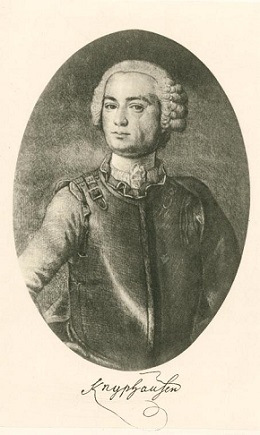Spy System 1777 
Page VII
So urgent was the intelligence concerning the latest British troop movements, that Clark sent a follow-up letter just a few hours later, noting:
I have just returned from Springfield, having met one of my spies on the road; he informs me that Gen. Sir Wm. Howe and Sir Wm. Erskine, and a number of other generals, are with the army at Derby, refreshing the troops; they have a very formidable body with them . . . Intelligence from another says they've 200 Waggons with them-I shall order my Spy to return & bring me further information

General Stirling
Illustration from
Harper's Encyclopędia of United States History, Vol. I, 1905
Washington, upon this notification, attempted to assemble a division under Major General Lord Stirling to oppose the enemy forage, but, because of the debilitated condition of his troops, was only able to muster a few men capable of sustaining such a march; far too few to effectively resist Howe's powerful corps, which included the greater part of the British Army.
On December 23rd Clark was able to give Washington an intimate account of British foragers:
. . . they are busy halling Hay from the Marshes about Kingsess, & don't venture a Mile in the Country from their Pickets-they say they intend to forage all that Country, burn the Fences, plunder the Inhabitants & then return.
Clark then describes a tense encounter in which he acted directly on intelligence he had gathered, ordering a harassing attack on foraging British troops. Clark's men were surprised by some British troops in disguise, who managed to shoot one, while the other escaped. Clark himself was subsequently nearly captured, but narrowly escaped:
I received information that a party of the Enemy in number about 30, unarmed, were plundering in the Neck, I immediately posted two Horsemen in the Road with orders when the Enemy came in sight to fire their pieces & retire-& went of the Road in quest of the plunderers-during my absence the Enemy's Light Horse came out to my Videtts & being in disguise call'd to them & informed them they belong'd to our Army, & by this means got up within a few Yards of them, & fired their Carbines, they shot one of them, & the other made his escape-they then pursued me with the party but I fortunately knew the Road & came off within a few yards of their picket,
Clark had little good news to report in subsequent days. The Americans were outnumbered and their provisions deplorable. He wrote to Washington on December 25, but bore no tidings of comfort or joy:
the wretched situations of the Troops here is much to be lamented, no provisions provided for them, ill clothed, many of 'em no Shoes, & they are scattered in sixes & sevens all about the Neighbourhood, in short, they had better be called away . . . If we had at this time 200 Light Dragoons in this quarter, we might catch the Enemy by dozens-& as they seldom send above a Troop of Horse together, we shou'd be able to take them in the same manner-but as matters Are at present in this quarter, the Enemy will do what they please, almost unmolested.

General Knyphausen
A considerable portion of British troop strength in the region were occupied protecting the foragers, leaving Philadelphia light on defenses. Clark wrote to Washington on the 26th, suggesting once again that the city might be vulnerable to attack:
My spy from the city has just arrived, and informs me General Knyphausen commands in the city, and has but very few troops with him . . .
But the Continental Army was in no condition to take advantage of this enemy weakness. Clark then provided further details of the British logistical situation, reporting that the enemy were amply supplied:
. . . at Grays ferry they have a very good Bridge of Boats, & chief of the Hay is taken over it from Tinicum-Day before Yesterday three Days provision was sent to the Troops at Derby-And as they've nearly compleated their business, I immagine they'll return this Evening.
But the enemy didn't begin to retire to Philadelphia until the 27th. Clark wrote to Washington the following day (December 28th):
Early this morning, a Spy came to me from Philadelphia, which place he left late last Evening, at that time, Sr Wm Howe had just arrived, & the Van of his Army had got over Schuylkill, a great many Troops were marching from this side the ferry towards the City
The British continued to ferry troops along the Schuylkill river to Philadelphia. On December 30th Clark reported to Washington that:
the Enemy are all over the Schuylkill except a Guard at the middle Ferry, they have taken up their Bridge at Grays, & say, that so soon as they've haul'd their Wood from this side, they will take up that at middle Ferry also.
The balance of Clark's December 30 letter concerned some thieves who presented themselves as agents of Washington's army, in order to rob citizens, engendering considerable undeserved resentment for the continental Army:
. . . there are a set of Gentry that infest the public Roads between this, & Schuylkill & call themselves "Volunteers" they are under no authority, & pay no respect to persons having passes or not, & indeed, are no better than as many highway Robbers, & unless they are speedily removed will make many Enemies of those, who are now our Friends . . . These people rob, steal, and plunder persons without distinction, & lay it on the Army, & 'tis believed they've Orders for so doing, nay they threaten the lives of the Inhabitants if they go to complain, in short it gives me pain to trouble your delicacy with this account, but 'tis my duty.



